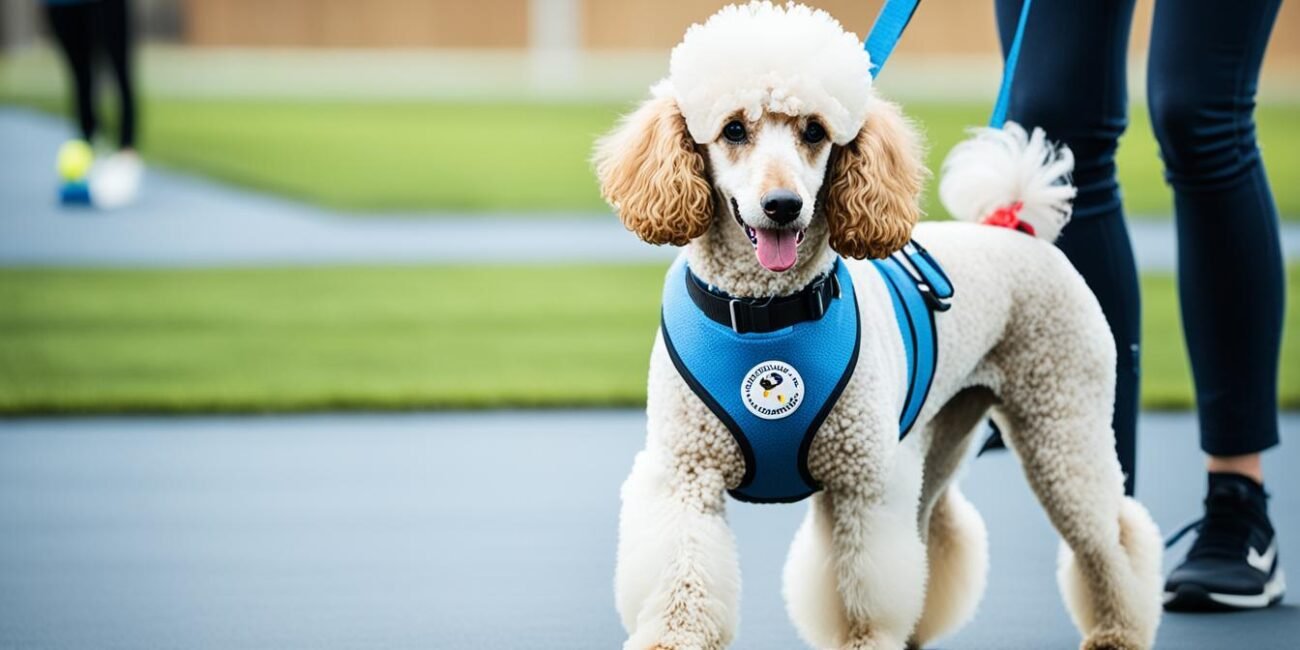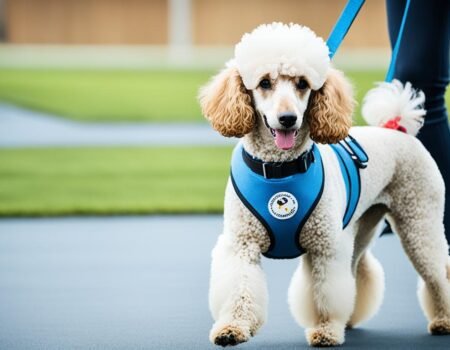Are you the proud owner of a Poodle or considering bringing one into your home? Well, you’re in for a treat! Poodles are not only known for their elegant appearance but also their exceptional intelligence and trainability. Our furry friends are eager to please, making them a joy to train and a delightful addition to any family.
However, as with any dog breed, proper obedience training is vital to ensure your Poodle becomes a well-behaved and happy companion. Whether you have a poodle puppy or an adult Poodle, we’re here to share our top tips and secrets for effective and successful Poodle training.
Throughout this article, we’ll dive into the importance of starting training early, the power of positive reinforcement, the role of consistency, and so much more. By incorporating these expert tips into your training routine, you’ll develop a strong bond with your Poodle while teaching them the necessary skills to thrive in any situation.
Key Takeaways:
- Starting early is crucial for establishing clear boundaries and expectations in Poodle training.
- Positive reinforcement, such as rewards and praise, is a powerful tool for encouraging desired behaviors in Poodles.
- Consistency in commands, schedules, and expectations is key to successful training.
- Short and engaging training sessions help Poodles stay focused and retain information.
- Using clear and simple commands ensures better understanding for your Poodle.
Starting Early: The Importance of Puppy Training
Puppy training is a vital foundation for raising a well-behaved and obedient Poodle. Starting early lays the groundwork for establishing clear boundaries and expectations, setting your puppy up for success in their journey towards becoming a well-adjusted adult dog.
When it comes to poodle puppy training, consistency and positive reinforcement are key. By teaching basic obedience commands like “sit,” “stay,” and “come” from a young age, you establish a language of communication and build a strong bond with your furry companion.
Short, engaging training sessions are more effective for puppies as they have limited attention spans. Aim for 10-15 minutes of focused training, 2-3 times a day. This regularity promotes better focus, retention, and overall learning ability in your puppy.
Positive reinforcement is a powerful tool in specialized poodle training. By rewarding desired behaviors with treats, praise, or playtime, you create a positive association and motivate your puppy to continue exhibiting good behavior.
In the early stages of training, it’s important to be patient and realistic with your expectations. Remember that every puppy learns at their own pace, and progress may vary. Celebrate small victories and milestones along the way, and always maintain a positive and encouraging attitude.
“The earlier you start training your puppy, the stronger the foundation you build for a well-behaved adult dog.”
Effective poodle puppy training requires dedication and consistency. Start early, be patient, and focus on positive reinforcement to lay the groundwork for a well-mannered poodle companion.
The Benefits of Starting Early
By beginning puppy training at an early age, you pave the way for a lifetime of good behavior. Here are some key benefits of starting early with specialized poodle training:
- Better communication: Teaching basic commands early on helps establish a common language between you and your puppy. This improves communication and strengthens your bond.
- Reduced behavioral issues: Proper training sets clear expectations and boundaries, preventing common behavioral problems such as chewing, biting, or excessive barking.
- Improved socialization: Starting early allows your puppy to develop positive associations with various experiences, people, and animals, leading to improved social skills.
- Enhanced obedience: Early training lays the foundation for obedience, making it easier to teach more advanced commands as your puppy grows.
Investing time and effort into your poodle’s early training pays off in the long run. So, start early, stay consistent, and enjoy the journey of shaping your puppy into a well-behaved and happy adult dog.
The Power of Positive Reinforcement
When it comes to poodle training, positive reinforcement is a powerful and effective method. This approach involves rewarding the Poodle with praise, treats, or playtime when they exhibit desired behavior. By associating good behavior with positive outcomes, the puppy is motivated to repeat the behavior in the future.
Positive reinforcement works by reinforcing the connection between the desired behavior and the reward. When the Poodle performs the desired behavior, such as sitting or staying on command, they receive immediate reinforcement in the form of praise or a delicious treat. This positive experience strengthens the link between the behavior and the reward, making it more likely that the Poodle will repeat the behavior in the future.
It’s important to remember that positive reinforcement should be used consistently and immediately after the desired behavior occurs. This ensures that the puppy understands exactly what behavior is being reinforced. Consistency is also key when it comes to rewards. Use the same types of treats or praise consistently to reinforce the behavior effectively.
Positive reinforcement has several benefits in poodle behavior training. It promotes a trusting and positive relationship between the trainer and the puppy, creating a positive training environment. It also helps to build the puppy’s confidence and encourages them to actively engage in the training process.
With positive reinforcement, poodle training becomes a rewarding and enjoyable experience for both the trainer and the puppy. By focusing on the desired behaviors and rewarding them, you can effectively shape your Poodle’s behavior and help them become a well-behaved and obedient companion.
Benefits of Positive Reinforcement:
- Establishes a positive and trusting relationship between trainer and puppy.
- Builds the puppy’s confidence and encourages active participation in training.
- Creates a positive training environment.
- Effectively shapes desired behaviors in the Poodle.
Example of Positive Reinforcement in Action:
“When teaching your Poodle to sit, start by giving the command ‘sit’ while gently guiding them into the sitting position. As soon as their bottom touches the ground, praise them enthusiastically and give them a small treat. Repeat this process consistently until your Poodle understands the command and sits on cue. Remember to always reward the desired behavior immediately to reinforce the connection.”
Comparison of Positive Reinforcement and Punishment
| Methods | Positive Reinforcement | Punishment |
|---|---|---|
| Effectiveness | Highly effective in promoting desired behaviors | Can suppress unwanted behaviors, but may also lead to fear and anxiety |
| Relationship | Fosters a positive and trusting relationship between trainer and puppy | May damage the trust and relationship between trainer and puppy |
| Learning | Promotes active learning and engagement in the training process | May cause avoidance or shut-down behaviors in the puppy |
| Long-term Results | Creates lasting behavior change and encourages continued learning | May lead to suppressed behaviors or the development of new unwanted behaviors |
Consistency is Key in Poodle Training
When it comes to training your Poodle, consistency is the secret ingredient for success. The entire household must be on the same page, using the same commands and rewards during training sessions. This consistency helps prevent confusion and establishes clear expectations for your Poodle.
Having a consistent approach also means following a set schedule for training sessions. Regular and structured training sessions help your Poodle understand what’s expected of them and create a routine that promotes learning and obedience.
Benefits of Consistency in Poodle Training
Consistency plays a vital role in your Poodle’s overall development and training progress. Here are a few key benefits:
- Clear Communication: Using consistent commands and rewards allows your Poodle to understand and respond to your instructions effectively.
- Establishing Boundaries: Consistency helps your Poodle understand the boundaries and rules of their behavior, promoting good manners and obedience.
- Building Trust: When your Poodle sees consistent behavior from you, they develop trust and confidence in your leadership, making the training process smoother.
- Accelerated Learning: Consistent training methods help your Poodle learn faster as they can focus on understanding and practicing specific behaviors without confusion.
In addition to using consistent commands and rewards, it’s crucial to maintain consistency in your body language, tone of voice, and overall demeanor during training sessions. Dogs are highly perceptive and can pick up on subtle cues, so being consistent in every aspect of your training approach contributes to building a strong foundation of obedience.
Remember, advanced poodle training techniques require a consistent commitment from both the trainer and the Poodle. By incorporating consistency into your training routine, you’ll enhance your Poodle’s learning experience and ensure their continued growth and development.
Key Takeaways for Consistent Poodle Training
Here are a few key takeaways to keep in mind for consistent poodle training:
- Use the same commands and rewards consistently throughout the household.
- Create a schedule for training sessions and stick to it.
- Maintain consistent body language, tone of voice, and demeanor during training.
- Understand the benefits of consistency in poodle training, including clear communication, establishing boundaries, building trust, and accelerated learning.
Consistency is the foundation of professional poodle training that leads to a well-trained and obedient Poodle. With patience, dedication, and a consistent approach, you’ll be on your way to enjoying a harmonious relationship with your furry friend.
Short and Engaging Training Sessions
Puppies have limited attention spans, so it’s important to keep training sessions short and engaging. Aim for 10-15 minute sessions, 2-3 times a day. Quality over quantity is the key to successful poodle puppy training that promotes better focus and retention of information.
Long, drawn-out training sessions can overwhelm young puppies and lead to boredom and disinterest. By keeping the sessions short and focused, you can capture and maintain your poodle’s attention, ensuring effective learning and faster progress.
Additionally, incorporating engaging activities and interactive play during training can make the sessions more enjoyable for your poodle. This not only helps keep them motivated but also strengthens the bond between you and your furry friend.
Remember to provide regular breaks between training sessions to avoid mental fatigue. This allows your poodle to process what they have learned and prevents frustration or burnout.
When planning your training sessions, consider the following tips:
- Vary the training exercises to keep your poodle stimulated and interested.
- Use positive reinforcement techniques, such as treats or praise, to reward desired behaviors.
- Focus on one command or behavior at a time to prevent confusion.
- End each session on a positive note with a successful command execution.
Poodle Puppy Training Schedule
| Training Session | Duration | Frequency |
|---|---|---|
| Morning Session | 10-15 minutes | 1 time per day |
| Afternoon Session | 10-15 minutes | 1 time per day |
| Evening Session | 10-15 minutes | 1 time per day |
Follow this sample poodle puppy training schedule to build consistent training habits and establish a routine that aligns with your busy lifestyle. Remember, short and engaging sessions are key to effective poodle puppy training. With patience and consistency, your poodle will become a well-behaved and obedient companion.
Clear and Simple Commands
When teaching a Poodle obedience, it’s essential to use clear and simple commands that are easy for them to understand. Avoid using multiple words for the same command to prevent confusion. Stick to one-word commands like sit, stay, down, and come for better results.
Poodles are intelligent dogs and can quickly learn commands when they are presented in a clear and concise manner. Using simple commands helps them focus on the desired action and reduces the chances of miscommunication between you and your Poodle.
Here are a few tips for using clear and simple commands during Poodle obedience training:
- Choose one-word commands: Opt for single-word commands that are easy to remember and understand. For example, use “sit” instead of “sit down” or “lie down.”
- Use consistent gestures: Along with verbal commands, pair them with consistent hand gestures. This helps your Poodle associate the gesture with the command, making it easier for them to follow.
- Reinforce commands with positive reinforcement: When your Poodle successfully follows a command, reward them with praise, treats, or playtime. This positive reinforcement strengthens the association between the command and the desired behavior.
Remember, consistency is key when using commands. Use the same words and gestures every time to avoid confusion for your Poodle. Repetition and practice will solidify the commands in their mind and improve their obedience.
Example:
Sit: Use this command when you want your Poodle to sit down. Pair it with a hand gesture of raising your hand slightly, palm facing up.
Stay: This command tells your Poodle to remain in place. Extend your palm towards them, signaling them to stay.
Down: Use this command when you want your Poodle to lie down. Hold your palm towards the ground, signaling them to lower their body.
Come: This command encourages your Poodle to come towards you. Open your arms wide and call them by their name to signal them to come to you.
By using clear and simple commands, you can effectively communicate with your Poodle during obedience training, leading to better results and a stronger bond between you and your furry companion.
Patience in Poodle Training
When it comes to training a poodle, patience is a vital attribute that every trainer should possess. Poodles are intelligent dogs, but they may not grasp commands immediately. As professional poodle trainers, we understand the importance of remaining calm and composed during training sessions, allowing the puppy the time they need to understand and learn.
Training a poodle requires a patient and understanding approach. Rushing the training process can lead to frustration and hinder progress. Taking the time to establish a strong foundation through consistent training methods will yield better long-term results.
During training sessions, it’s essential to maintain a positive and encouraging environment. Poodles respond well to positive reinforcement, so praising and rewarding them when they follow commands correctly will motivate and reinforce their good behavior. Avoid getting frustrated or using punishment-based techniques, as these may lead to fear or anxiety in the poodle, hindering their overall progress.
It’s important to remember that each poodle is unique and will progress at their own pace. Some puppies may learn quickly, while others may require more time and repetition. Being patient with your poodle and celebrating small victories along the way will keep both you and your furry companion motivated.
“Patience is not the ability to wait, but the ability to keep a good attitude while waiting.” – Joyce Meyer
Benefits of Patience in Poodle Training
By embracing patience in poodle training, you can unlock several benefits:
- Building a strong bond: Patience allows you to establish trust and build a strong bond with your poodle. This relationship is essential for effective communication and obedience.
- Reducing stress and anxiety: A patient approach creates a calm and supportive environment for your poodle, reducing stress and anxiety during the training process.
- Enhancing learning and retention: Allowing sufficient time for your poodle to absorb and understand commands improves their learning abilities and increases information retention.
- Encouraging a positive mindset: Patience fosters a positive mindset for both the trainer and the poodle, leading to a more enjoyable training experience for both parties involved.
In conclusion, practicing patience in poodle training is essential for achieving successful results. By staying calm, consistent, and understanding, you can effectively teach your poodle obedience and develop a happy and well-behaved pet.
| Benefits of Patience | Details |
|---|---|
| Building a strong bond | Establishing trust and strong communication |
| Reducing stress and anxiety | Creating a calm and supportive environment |
| Enhancing learning and retention | Improving learning abilities and information retention |
| Encouraging a positive mindset | Promoting a positive training experience for both the trainer and the poodle |
Socialization for a Well-Behaved Poodle
Socialization plays a crucial role in the successful training of a Poodle. By exposing your furry friend to various environments, people, and animals, you can help them develop the necessary confidence and appropriate behavior for different situations. This section will explore the importance of socialization and its impact on preventing future behavioral issues such as aggression and fearfulness.
Proper socialization involves introducing your Poodle to different stimuli in a controlled and positive manner. This can include visits to parks, walks in busy areas, and interactions with other well-behaved dogs and friendly individuals. By gradually increasing the level of exposure, your Poodle will become accustomed to new experiences and learn to navigate them with ease.
One important aspect of socialization is exposing your Poodle to different types of people. This can help prevent fear or aggression towards strangers and promote a friendly and well-mannered demeanor. Encourage friends and family members to interact with your Poodle, ensuring they approach in a calm and non-threatening manner.
Introducing your Poodle to a variety of animals is also essential for their socialization. This can include interactions with other dogs, cats, and smaller pets such as rabbits or birds. Supervised playdates and controlled encounters will help your Poodle learn appropriate social cues and develop positive relationships with other animals.
Remember, it’s important to ensure that all interactions during socialization are safe and positive. Monitor your Poodle’s reactions closely and intervene if necessary to prevent any negative experiences.
Socialization should begin as early as possible, ideally during the critical socialization period between the ages of 3 and 14 weeks. However, if you have an adult Poodle that lacks socialization, it’s never too late to start. Be patient and gradually expose them to new environments and experiences, always keeping their comfort and well-being in mind.
| Benefits of Socialization | How to Socialize Your Poodle |
|---|---|
|
|
Redirection for Unwanted Behaviors
Fostering positive behavior in Poodles is essential during their training journey. Instead of resorting to punishment for unwanted behaviors, a redirection approach can yield more effective results. By redirecting the Poodle towards a more positive alternative, you can discourage negative behavior and help them understand appropriate outlets for their energy and instincts.
One common example of redirection is when a puppy engages in furniture biting. Instead of scolding or reprimanding the puppy, offer them a chew toy as a substitute. Redirecting their focus to an acceptable and enjoyable activity encourages positive behavior and satisfies their natural urge to chew.
“Redirecting a Poodle’s behavior is a valuable technique that allows us to guide them towards appropriate actions without resorting to punishment. By providing alternative options and reinforcing positive behaviors, we help foster a stronger bond with our furry friends.”
The Benefits of Redirection
Redirecting unwanted behaviors offers a range of benefits for both the puppy and the trainer. It promotes a positive training environment based on understanding and cooperation. Here are some advantages of using redirection techniques:
- Creating Positive Associations: By redirecting the Poodle’s attention towards more suitable activities, you help them form positive associations and reinforce desired behaviors.
- Preserving Trust and Bonding: Redirection allows you to address unwanted behaviors while maintaining a loving and trusting relationship with your Poodle. It prevents fear or anxiety that could result from punishment-based training methods.
- Channeling Natural Instincts: Poodles, like many other dog breeds, have natural instincts that may manifest as unwanted behaviors. Redirection provides an opportunity to channel those instincts into appropriate outlets, such as providing suitable chew toys to satisfy their need to chew.
- Better Understanding of Boundaries: Consistent redirection helps the Poodle understand their boundaries and demonstrates what is considered appropriate behavior within the household.
Remember, redirection is more than just a quick fix for unwanted behaviors. It is a mindful approach that teaches the Poodle acceptable alternative actions while acknowledging their natural instincts and needs.
Next, we will explore the importance of setting realistic expectations in poodle training to ensure a positive and rewarding journey for both the owner and the puppy.
Realistic Expectations in Poodle Training
When it comes to poodle obedience training, setting realistic expectations is crucial for both the owner and the puppy. Every puppy learns at their own pace, and expecting too much too soon can lead to frustration and setbacks in the training process. By understanding and accepting this, we can create a positive and effective training environment.
It’s important to remember that advanced poodle training techniques require time, patience, and consistency. While some puppies may quickly grasp commands and exhibit exemplary behavior, others may take more time to understand and respond. This variation is normal and should be anticipated.
Instead of focusing solely on achieving the end goal, we encourage celebrating small milestones along the way. Recognizing the puppy’s progress and efforts through rewards, praise, and positive reinforcement boosts their confidence and motivation to continue learning.
“Puppies are like children, each with their own unique abilities and learning styles. Realistic expectations allow us to enjoy the process of training and appreciate the journey.”
Throughout the training journey, it’s essential to be patient with the puppy’s progress. Avoid unnecessary pressure and understand that setbacks or temporary regressions are part of the learning process. Stay committed, consistent, and understanding, nurturing a supportive and positive training environment.
Acknowledging that not every training session will be perfect and that the puppy’s development occurs over time allows us to approach poodle training with a realistic perspective. The goal is to build a strong bond with our furry companion while instilling good behaviors and obedience.
| Benefits of Realistic Expectations in Poodle Training |
|---|
| 1. Reduces frustration for both the puppy and the owner |
| 2. Encourages a positive and patient mindset |
| 3. Celebrates the puppy’s progress and boosts their confidence |
| 4. Creates a supportive and nurturing training environment |
| 5. Fosters a strong bond between the owner and the poodle |
By incorporating realistic expectations into poodle obedience training, we can create an enjoyable and effective training experience for both the owner and the puppy. Remember, it’s the journey and the process that truly matter in nurturing a well-behaved and happy poodle.
Seeking Professional Help and Online Courses
In some cases, professional help may be needed for professional poodle training. Certified dog trainers or behaviorists can provide guidance and tailored training techniques based on your Poodle’s specific needs. Their expertise and experience can greatly enhance the training process, helping you achieve the desired results more efficiently and effectively.
When searching for a professional dog trainer, it’s important to look for someone who is experienced in dog training for poodles. They should have a good understanding of the breed’s unique characteristics and requirements. You can inquire about their certifications, credentials, and past successful experiences with poodle training.
Additionally, online dog training courses or programs can be valuable resources for dog owners. Platforms like SpiritDog’s “Perfect Obedience” Course and K9 Institute’s “Dog Masterclass” offer comprehensive training materials and step-by-step guidance that you can access from the comfort of your own home. These courses are designed by professionals and provide structured training programs to address various aspects of dog training for poodle.
Remember, seeking help from professionals and utilizing online training resources is a proactive step towards ensuring the success of your poodle’s training journey. By investing in professional guidance and education, you can set your poodle up for a lifetime of good behavior and strong obedience skills.
FAQ
When should I start training my Poodle puppy?
It’s important to start training your Poodle puppy as soon as possible. Early training helps establish clear boundaries and expectations.
What training methods are best for Poodles?
Positive reinforcement is highly effective for training Poodles. Rewarding desired behavior with praise, treats, or playtime encourages them to repeat the behavior.
How can I maintain consistency in Poodle training?
It’s crucial for all household members to use the same commands and rewards. Consistency in approach, schedule, and expectations contributes to a well-trained Poodle.
How long should training sessions be?
Poodle puppies have short attention spans, so aim for 10-15 minute training sessions, 2-3 times a day. Short but focused sessions yield better results.
What commands should I use when training my Poodle?
Stick to clear and simple commands like “sit,” “stay,” “down,” and “come” for better understanding. Avoid using multiple words for the same command.
How important is patience in Poodle training?
Patience is essential. Poodles are still learning, and it may take time for them to grasp commands. Stay calm and composed during training sessions and give them the time they need.
Why is socialization important in puppy obedience training?
Socialization exposes your Poodle to various environments, people, and animals. This helps them develop confidence and appropriate behavior in different situations.
What should I do if my Poodle exhibits unwanted behaviors?
Instead of punishing, redirect them towards more positive alternatives. For example, offer a chew toy instead of biting furniture. This discourages negative behavior and guides them towards appropriate outlets.
Are there realistic expectations for my puppy’s progress in training?
Each puppy learns at different paces, so it’s important to set realistic expectations. Celebrate small milestones and be patient with your Poodle’s progress.
When should I seek professional help for my Poodle’s training?
If needed, consult with certified dog trainers or behaviorists who can provide guidance and tailored techniques. Online courses like SpiritDog’s “Perfect Obedience” Course and K9 Institute’s “Dog Masterclass” can also be valuable resources.











No Comment! Be the first one.